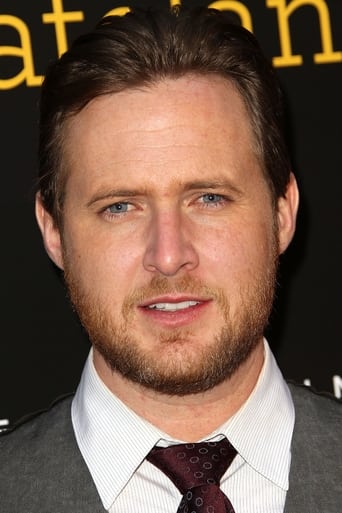BootDigest
Such a frustrating disappointment
Nonureva
Really Surprised!
Billy Ollie
Through painfully honest and emotional moments, the movie becomes irresistibly relatable
Robert J. Maxwell
Agnes Bruckner is a high-school senior from what is now commonly called a dysfunctional family. Her father has left the family. Her mother, Margaret Colin, is holding down a twelve-hour job and going to school at night. And Agnes must care for her little sister, Regan Arnold, who seems to have childhood schizophrenia. Her friends all have unethical quirks and Bruckner herself is given to shoplifting.Her only outlet seems to be poetry and she comes up with an impressive one she calls "Blue Car." This gets the attention of her teacher in the Advanced Placement class, David Strathairn, and he encourages her to enter a poetry contest to be held in Tampa. She's accepted as a contestant.Her home life being as rotten as it is, Bruckner invests a good deal of herself in the relationship with her teacher. He's reserved, friendly but cool at the same time, a perfect gentleman who may go places some day because, as he tells her, he's writing a novel. He keeps the manuscript in a briefcase and won't allow anyone to read it.Bruckner must sneak away to the contest in Tampa because her mother, preoccupied with her own problems and trying to keep the family on a tight budget, has put the kibosh on the trip.In Tampa, Bruckner runs into Strathairn and his family -- a wife and two kids. When the two are alone, Strathairn gives her a kiss and asks if it's alright. Bruckner assents, the two wind up in bed, and Strathairn deflowers her, somewhat to her discomfort.SPOILER.Afterward, Bruckner begins poking through Strathairn's briefcase, flips through the manuscript of the novel, and finds all the pages blank, except for a few which have stick-man drawings in the margins. A poem that Strathairn has claimed as his own turns out to have been written by Rilke.When her turn comes to read her poem before a vast audience, including Strathairn and his family, she lets him have it. She's discarded "Blue Car" and substituted another that is a raw, bleeding attack on the phony Strathairn.I didn't really care for the film that much, though I applaud its quiet intensity. It's familiar territory, the youth disillusioned by a mentor. We've seen it in, oh, "The Flamingo Kid," "Hearts of the West," and others. But at least this is from the point of view of a young girl who finds respite from real life in poetry. If I have to watch another movie about teen-aged boys trying to make money and get laid, I think I'll vomit.Strathairn is fine as the distant teacher trying to keep his hormones in check, and Margaret Colin, as always, is good in the role of the distraught mother. Even the little sister gives a believable performance, though she's only about six. Bruckner, on the other hand, is bulkily pretty but wears a hangdog expression throughout, as if playing an instrument on which there was only one note.I don't know if the writer/director, Karen Moncrieff, intended it or whether it stems from some brutalization of my own emotional apparatus but I felt considerable sympathy for both Margaret Colin's super-tense Mom and David Strathairn's shamed, phony novelist. Imagine the teacher's character. So lacking in self esteem that he must invent an alter identity for himself -- the promising novelist -- but feeling so low about the trick that he doesn't brag about it, just let's it fall casually and infrequently into conversations. What a tightrope the guy is walking, like a gay guy not out of the closet. The merest HINT in Bruckner's final poem, the slightest pin prick letting him know that she's uncovered his secret, would have brought him down. Instead, she hits him over the head with a crowbar.Strathairn has learned something, namely that you can only carry on a pretense for so long and that eventually your fraud, however modest, is uncovered -- especially by some nosy young girl who goes poking around in your personal effects. But what has Bruckner learned? That you can't trust anyone but yourself? I don't know if that moral calculus all works out.
MrGKB
...despite its somewhat melodramatic plot line, far, far worse indeed. Writer/director Karen "The Dead Girl" Moncrieff's tyro effort benefits immensely from the impressive acting chops of (then) newcomer Agnes "Blood and Chocolate" Bruckner and the already well developed talents of David "Good Night, and Good Luck" Strathairn. The film's central theme of naive youth overcoming adversity is nothing new, nor are the particulars of broken adults taking advantage of vulnerable, trusting innocence, but the relative delicacy with which Moncrieff handles all the soapy goings-on puts "Blue Car" miles ahead of like-minded indies (cf. "The Good Student"), allowing Bruckner, Strathairn, and the rest of the ensemble something of substance to latch onto and form characters that the viewer actually cares about. "Blue Car" may only be a step or two above mediocre movie-of-the-week fare, but they're still admirably significant steps.To be honest, I'm mostly motivated to comment on this title because it was shot in and around my home town. Interestingly, beyond one bit of dialogue and a (very) few recognizable locations, you'd never know it. The interiors for the "Florida" poetry contest, for instance, were shot in Ohio (as was most of the film), and although specifically placed in that state, "Blue Car" is pretty much an Anywhere, U.S.A. story. It's a character piece, and if not high art, it's still aiming for the sky.Of definite interest to Bruckner or Strathairn fans, as well as a fine bit of foreshadowing to Moncrieff's far superior "The Dead Girl," "Blue Car" is still worth a watch to anyone who enjoys a nicely told story from the heart. Its paucity of budget may be more than visible, but there's no cheapness in its intent. Recommended.
CadWalliter
(Note to readers: there are definitely spoilers here!) This movie seems to have gotten high marks from viewers, but it didn't strike me as being praiseworthy. Some of my issues with the film: it was melodramatic yet dull, mostly pointless, and some of the situations are just ridiculous (such as Lily's death- I doubt they generally leave windows open- or even easily accessible- on the Psych Ward! I also doubt they leave suicidal children unsupervised).My main complaint is that the characters' behavior is often bizarre. Their motivations aren't very well fleshed-out, leaving the viewer (at least this viewer) wondering, "who the heck acts like that??". That combined with the very slow pace made me more irritated with the characters than sympathetic. Agnes Bruckner, however, is quite a talented and lovely actress and made Meg likable if nothing else.All in all I give this movie a four- it's just OK. Not good, not bad, but OK. I'd take John Hughes over Blue Car any day- at least his movies keep me awake!
sasamijurai
SPOILERMy personal feeling about this movie is summarised in the subject line. Too many bad things happened to this girl (Meg) for it to be realistic, for example, Lily's death was totally pointless. It also would have solved the family's financial trouble for they should have sued for negligence, the psychotic child (any mediocre medical student would have picked up on her delusional preoccupation with angels) was a high risk for suicide- intentional or not and had already been in a psychiatric ward. I cannot imagine how a multi-million dollar settlement could not have followed from this tragic event. See how unreal this film is? Meg leaves home, travels to Florida, where her gentle supportive teacher practically rapes her. It is a pity the pig was not arrested but in real life he would have (hopefully) been exposed, humiliated and promptly put behind bars. There are other points too, but for me - Lily's psychosis and death was the point where the word "kitsch" flashed across my mind.






